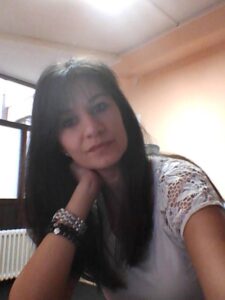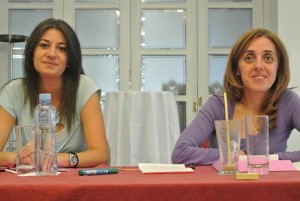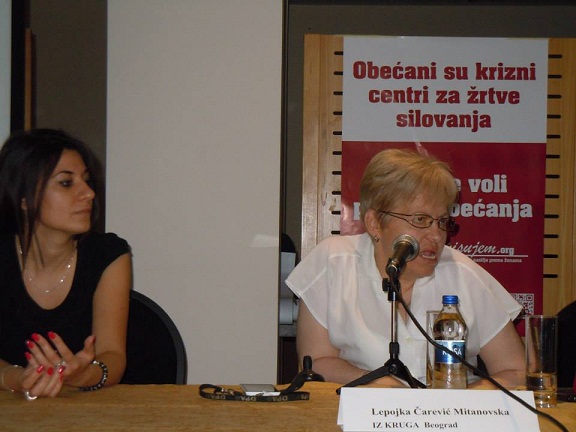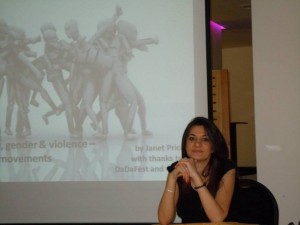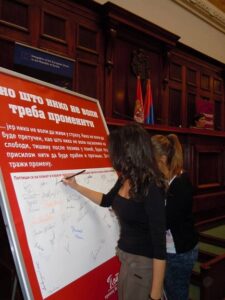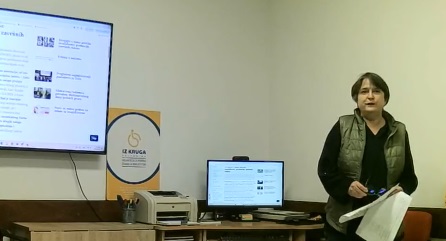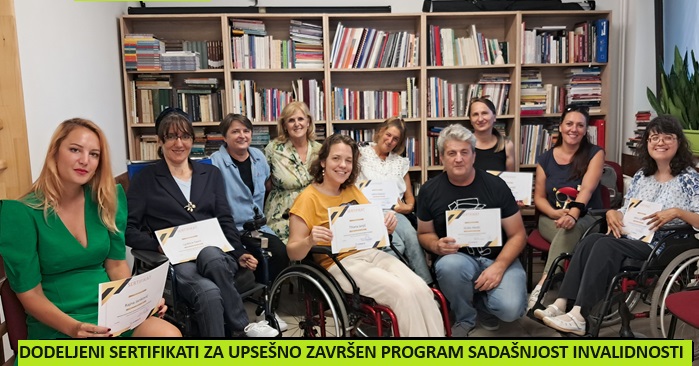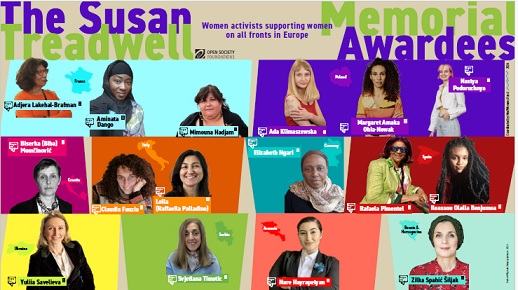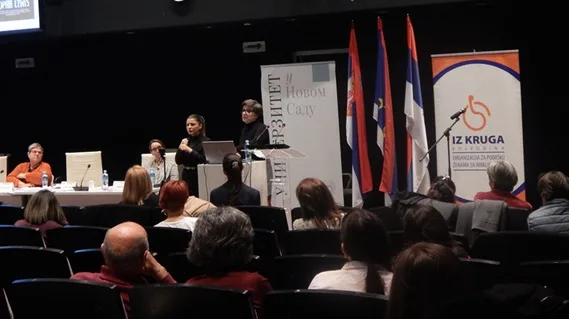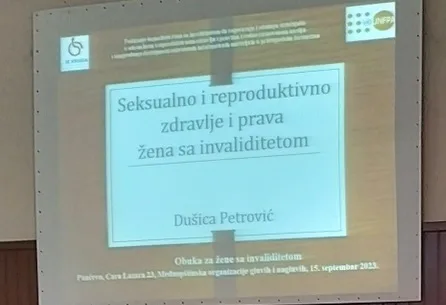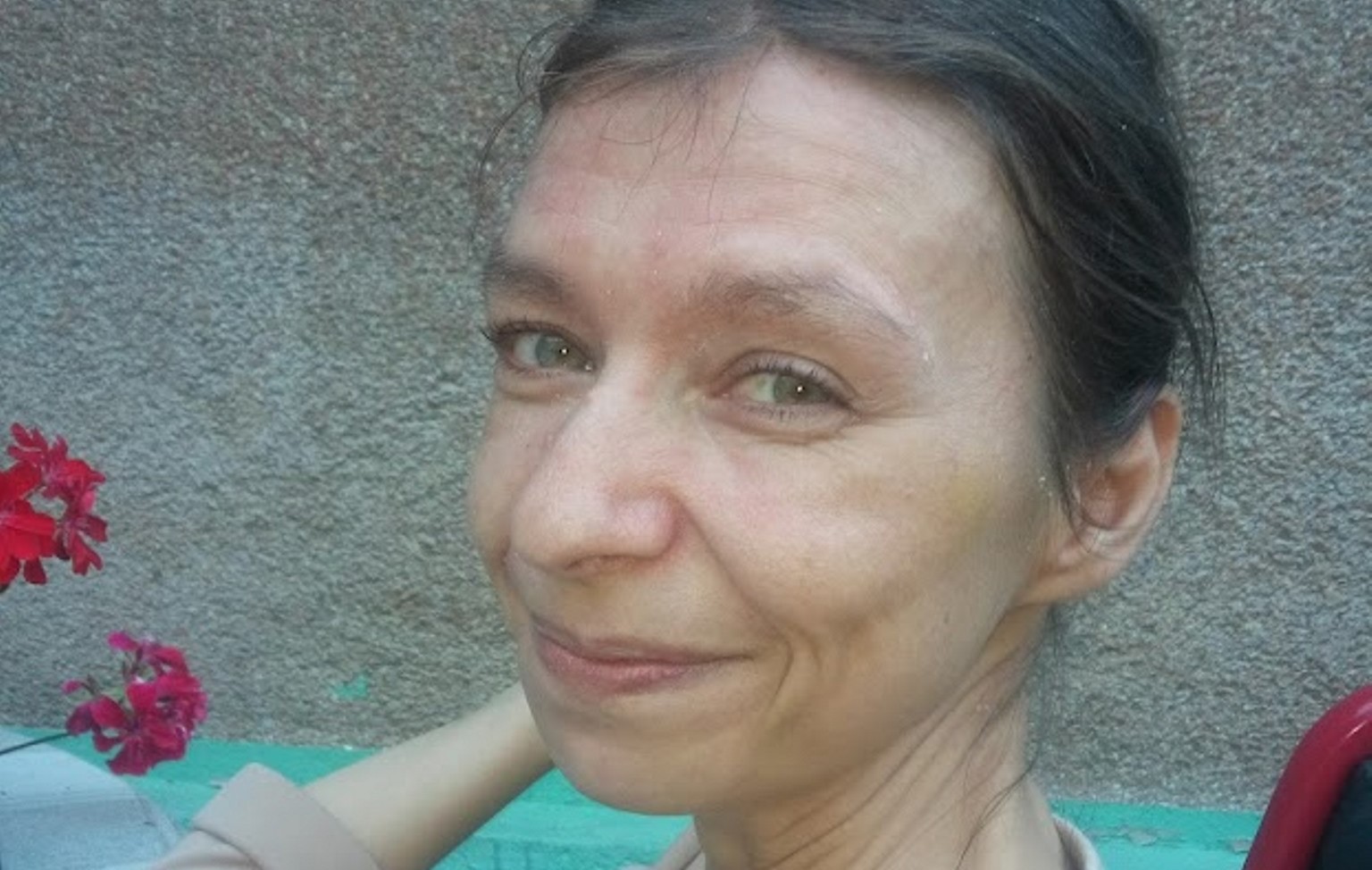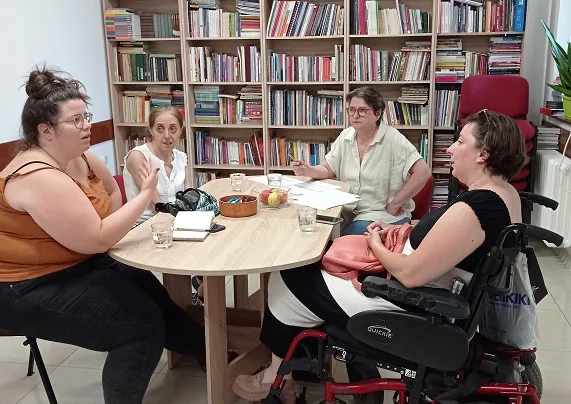What kind of profession is this? Advisory or for divorces? SOS – God save us – who needs that? Psychological support – that could be a humanitarian thing! Violence always happens to the other woman! Or every other, and then it’s my turn. Even if they live with them, women do not want to give birth to bullies. Is violence a psychiatric case file? No, violence is a choice a person makes. How can we unmask all those situations? If people who know me best don’t believe me, how can I call someone I do not know? Does she get paid to believe me? Solidarity-what is that, woman?
Ivana Nikolic, the coordinator of the SOS service and expert on gender-based violence, answers all these questions. Here is her story: evolving from a student of pedagogy to the woman that would change the law.
Profile of the interviewee: Ivana Nikolic
Profession versus occupation: graduated educationalist (master level on the to-do list). In real life: a coordinator of the SOS service in the organization …IZ KRUGA -VOJVODINA.
Hobbies, interest, obsessive actions: list-making for everything (shopping lists, to-do lists, packing lists when traveling). National movies as leisure – I can cite all of them, and the quotes somehow fit the occasions. Checking everything before I leave the room – sockets, switches, electrical appliances, locks (of course, I sometimes double-check everything). Music and humming to myself (depends on the mood: rock, chill out, radio).
How about the press-clipping of sensational journalism about crime during morning coffee in the office?
Oh yes, it is my daily ritual, the first thing I do when I come to work. When I applied for getting that specific press-clipping on the mail, I thought, „what am I going to do with it? Why am I bombing myself with those news from the early morning?“. And then, everything became more interesting, since the headlines were unbelievable! There is still no progress although, the journalists are trained how to report about violence. I am fascinated by their choice of „neutral“ words each morning: monstrous, horrible, terror! I keep track of the context of the violence report. The message behind it always refers to the responsibility of a woman herself, since she already had a reputation: she was already married or divorced, has illegitimate children, or engaged in suspicious wrongdoings. The social environment always justifies the abuser. I follow similar TV programs – File (Dosije), earlier Ricochet (Rikoset) and the message is almost always the same: Basically a good man, the true head of the household! What has happened to him? I recall a program Call 92 (Pozovite 92). I did not understand much at that time. Nowadays, I follow this kind of program professionally and analyze the context automatically. There are thousands of aspects involved. As a matter of fact, the intersection point between an SOS consultant and crime chronicles of a society is a pretty good starting point for serious research.
What is the most common profession in your extended family?
Everyone does different things. They are mainly in natural science, technical faculties, and the economy. On second thought, I am the only one in humanities. I have never liked numbers.
What do you consider to be your greatest weakness?
Ugh… to think that I can keep everything in control. Misjudgment of myself. A too big ambition to take over other people’s problems. A need to control. At first glance, it can appear as a strength, but essentially it is a weakness. I often think that I am in control of the situation, but when something goes wrong – which is inevitable – I feel overwhelmed. I also find it difficult to distinguish myself from the others that are close to me. I think of us as a whole. Their difficulties are not just theirs – I think of them as mine too. That is a weakness.
Do you set boundaries between professional and private life?
Yes, more and more. Even though I still didn’t reach the point to stop thinking about the woman that had called me that day when I closed the office door. I think about her – the thought crosses my mind a hundred times, which is only human. I doubt anyone in this line of work can say: I was professional for eight hours, and now I forget everything until tomorrow morning. To think about myself five years ago, of course, I balance more successfully. In the beginning, I had no idea what to do with all the stories I heard. Five years of experience in this walk of life taught me that I couldn’t solve other people’s problems and that I couldn’t and shouldn’t live their lives. SOS service is not a magic wand for beneficiaries. We need to take care of ourselves, from the things others expect from us, as well as our ambition.
For people working in the SOS line, it is significant to filter emotions. The meetings we have, so-called relax seminars, and anti-stress programs are benevolent for that purpose. In addition to emotional discharging, it is always good to work together on new dilemmas and questions. It is a genuine need, often underestimated in my environment.
I keep trying to refer you to your personal profile from the professional one. If you take into consideration historical characters, who would be diametrically different from you? A person you cannot identify at all, have anything in common, is absolute antipode?
Could we postpone this question? If you asked which memorable person I would like to meet – that is easy- when I was young, I wanted to hug Anne Frank. And who is my antipode? Someone austere, humorless, who frowns upon everything, silent, and withdrawn. Can you think of anyone?
It sounds like me. Only I am not memorable.
Oh, come on!
If someone made a film about your life, who would you choose to be a leading actress?
On the first thought, Milena Dravic. She always has goofy roles, and unexpected things happen to her. For example, in her movie Nije lako sa muskarcima, (It is not Easy with Males). Everything that could go wrong did. She presents all the mishaps with humor – that is what I do too, in the manner -Hide your fear with laughter. That is what I have in common with her.
How would you explain your job to someone living in the Middle ages?
It is next to impossible – explaining the protection of women to a person from the Middle ages. Nobody would understand. I would try to explain why it is valuable to respect your spouse and the mother of your children. I would emphasize woman’s part in living together. That would be a starting point to achieve a better position for women. See, I immediately imagined I argued with a male from the Middle ages. In the 21st century, I would probably talk about economic power in the context of gender equality. Explaining her inferiority to a woman from the Middle ages – she wouldn’t understand it is not the life she deserved. I would tell her that I back her up, trust her, listen to her. I am her support – whatever the life she is living is.
What is the first thing you think of when you think about the time at the university?
Discontent. Not at the very beginning, I came full of enthusiasm, looking forward to transferring from a province, changing the pace of life, all the novelties, and gaining my independence. Halfway through, I realized I had no connection with reality, not a clue what to do when I finish my education. There was only one professor that took us to a few places of interest – to a Care Facility for Young Adults with Disabilities in Veternik, Kovilj Monastery where is a hospice for drug addicts, and Children’s Village (for children without parental care) in Sremska Kamenica. The three visits meant more than four years of studying since we left the classroom and finally had contact with reality. It enabled us to get an insight into practical work. In other countries, students have three days of paid practical work a week., notified as years of practice. We know Plato’s and Russo’s theories – as if they apply to real situations! We left the university absolutely unprepared, but it is not specific just for students from my faculty. It is common for all faculties in the country. If I could go back in time, I am not sure that I would do the same. Faculty for Pedagogy is directed at work in schools. The social aspects I was interested in were not represented as much. There was one course about it. The work appeared inert – sitting in the office, waiting for a child to do something wrong? I couldn’t imagine myself in the place, in the role. I wanted something more dynamic. We had practical work at the finishing year and again at schools, where I confirmed what I definitely do not want to do in life.
How did you imagine your workdays?
I was absolutely sure that I would not find a job. I heard from my peers that they either volunteered, were on the labor exchange list or had jobs not related to our profession. It sounded devastating. I couldn’t wait to get a degree and become independent. The situation wasn’t unfolding in that direction. To imagine a workday was borderline to science fiction. I lowered my expectations – the only important thing was to start working, no matter what. While I was looking for a job, I applied to many schools, although it wasn’t my wish. The only sure thing was that I was not going back home after completing my studies. For some time, I considered going abroad and started learning German. But it was never a real plan, not even a wish. It was just a necessary way out of the situation. I am glad that I stayed.
Where and when did you first come across the SOS line?
Since we yearned for practical work during studies, a team from The Volunteer Centre Vojvodina visited us. They informed us about the places we could volunteer. We filled in a questionnaire about volunteer work, mainly kindergartens and schools. All students circled schools apart from myself. I circled something vaguely called Violence and Discrimination. It was a lightbulb moment for me- there is something for me there! A pile of filled questionnaires did not look encouraging. There were so many people looking for practical work. After some time, my colleagues bragged about their work, and I didn’t have a thing. Nobody called me! Until one day, I distinctly remember walking in the rain on the Boulevard when I received a call from the Volunteer organization. They told me that an organization recently founded dealing with violence and discrimination would call me for an interview. The very next day, I received a call from the organization …IZ KRUGA VOJVODINA. They called me for an interview. I was unbelievably happy but confused about the directions of how to find their premises. Their office was pretty small, with three people in it – Svjetlana, Marko and a girl. When Svjetlana gave me her hand for a shake, I was not sure how to do it. Marko, on the other hand, was looking through me. It took me a moment to realize that I am in an organization for people with disabilities! It was our first close encounter. I knew nobody with a disability at the University. I might have seen someone in a wheelchair at the campus- that was all. The idea of disability was alien, associated only with a wheelchair. For these reasons, I felt completely lost. „What am I doing here? What am I going to do? What does this have to do with discrimination and violence? I don’t get a thing! “ That said, it didn’t last long. The people I talked to were warm and outgoing. At the time, they campaigned for gynecological examinations for women with disabilities. They needed someone to conduct a survey: Why don’t women examine in years? I started going to the organization once a week, and that is how my own study of disability started. I participated in numerous meetings, events, and actions, listened and learned.
What kinds of training did you do to become a consultant at the SOS service?
The first seminar I attended was in Ecka. IZ KRUGA – VOJVODINA organized it with the title Persons with Disabilities – Democratic Strength. It lasted for seven days. We learned the basics of disability: who persons with disabilities are, types of disabilities, the terminology. If I had a dilemma up to that moment, I decided then: – This IS something I want to do! After a year or so, I trained for working on the SOS phone for women with disabilities. The training lasted for seven days, too, with a demanding curriculum. We worked from morning to night. Everything I learned there was captivating and engaging, but I honestly wondered If I would be able to do the job. I want to do this, but am I capable of carrying it out? A real dilemma. As time went by, I read more and more about violence and enrolled in additional courses dealing with the issue.
Autonomous Women’s Center organized a training – Instruction for working on the SOS phone for women victims of male violence. It lasted for six weekends, was very dynamic, and I find it essential for my decision. We learned about types of violence, techniques of active listening, practiced making conversations, etc. Each weekend I dived deeper into the issue. I remember the simulations of dialogues were very stressful. Two participants sat back to back, one reading the caller’s part, the other of a consultant of the SOS phone. We practiced every little thing: from the ringing, the first sentence we say when answering the phone, to active listening of the entire story. We practiced various situations; if a woman calls and says nothing, or she cries the whole time, or she talks too fast and changes subjects very quickly. What should we do in each situation? If she is silent, we need to give her time; but there are limits. If she cries, we need to let her and not make her uncomfortable because of it. If she talks too fast – because she finally has a chance to let everything out – you need to know how to show her to focus. Each situation we practiced was as stressful as a graduating exam at the university! The exercises corresponded totally to reality – that is how we saw them like we were getting a real call. I will never forget one situation. In the first SOS Circle Instruction, we were playing out a case of a woman that decided to kill herself after being in an abusive marriage for thirty years. One of the colleagues convincingly acted the call, saying she wanted to kill herself. The other one listened, sweated, and repeated: Don’t, don’t! The first one concluded: “ Dear girl, you didn’t help a bit, I am going to open the window and jump! The consultant jumped up, held the caller’s hand, and continued saying: „Don’t, don’t!“. We all burst laughing, realizing that in a real-life situation, you cannot jump through the phone handset and grab anyone by hand. There were all kinds of scenes – from the above-mentioned holding hands to absolute desperation and helpless looks to the lecturer: – How should I answer this? We all found the training stressful and novice. It was a committed preparation for the first real call. I acquired enforceable knowledge and the title of consultant on the SOS phone line.
Is it a profession that is officially recognized? Does it fall under the standard classification of occupations?
The vocation of a consultant refers to a person that works on an SOS line and gives support to women exposed to violence. Still, the situation varies because the conditions set at the time state that the person doing the job has to have a certain level of education within social studies – psychology, pedagogy, sociology. This standard did not correspond to actual needs, especially in the organizations providing support to Roma women or women with disabilities. If the consultant comes from a discriminated group, she understands the situation perfectly, might even be getting out of violence herself. The fact that she doesn’t hold a university degree does not make her less capable of doing the job. For this reason, a minimum standard has been established. It emphasizes accredited programs and the necessary number of hours spent in training for acquiring the title.
What does a coordinator do as opposed to a consultant?
A consultant is in direct contact with women, talks to them in person or via phone. A coordinator has more duties: database update, keeping logs, writing reports for donors, coordination with legal support, cooperation with media, and PR tasks. In addition, I hold courses about violence, take part in tribunes, street campaigns, protests, creating and distribution of info materials, etc. I completed training for trainers, which means I am qualified for leading the training courses about gender-based violence. I really love doing it! I have already done some for various groups: women with disabilities from small local communities, employers, university, and high school students. It is easy to tell the story within the circle familiar with gender relationships, disability, types of violence. Talking to someone out of it, that listens to the story for the very first time – that is always a great challenge!
Name some basic principles of working on the SOS phone?
First and foremost, confidentiality. There is no personal contact, nor can we see each other, and we need to build trust. It is significant for a woman to feel and know that whatever she says stays between the two of us. The second principle is trust: we always trust the woman and never question her stories. The fear of not being believed is omnipresent. As I’ve already said in the beginning, the woman always has a reputation – divorcee, married before, single mom, childless – while violent men are respectable. We trust the woman, and everyone matters equally!
It is also important to say that we do not evaluate the experiences women share with us. Whether it is psychological violence that lasts for half a year or a physical one that lasts for years – in both cases, it is violence, none harder or lighter than the other. These two principles are, in my opinion, the basic ones: confidentiality and trust without judging. Surely, there are more. We support and empower each other because we are women and because violence could happen to any of us – the principle of women’s solidarity.
We demonstrate them in every conversation. We tell the woman at the very beginning that the talk is confidential and that she need not leave her data. She even need not tell her name – if she doesn’t want to, she can use a pseudonym. I often hear them saying – I swear I am telling the truth! I keep saying that I have no doubts and that I am not questioning her statements. Some women say: – I could take a polygraph test to prove I am telling the truth. They expect that they will not be trusted and wonder how to prove their experience. When a woman calls for the first time, it is never about something that started last night or this morning, but about the violence that lasts for years. Why didn’t she call ten or fifteen years ago? She probably did not know about the SOS phone. She might have learned about it just yesterday, from a TV advert or heard from a neighbor. Simultaneously, something crucial happened yesterday or the day before. She is finally home alone, took some time to cry, and told everything she was silent about for years.
Do you remember your first conversation?
I could never forget it! Some organizations only do the SOS line, so when the phone rings, the consultants have no dilemma why the phone is ringing. It is different in our organization. The same number is used for scheduling gynecological exams, legal counseling, info center, and the SOS line. When the phone rings, I cannot know which service the caller will ask. I remember, I answered casually, said my name and the organization – didn’t expect the SOS call at all. On the other side, I heard a woman crying, telling me all sorts of things. In a moment, sweat poured, my hands started shaking, I didn’t know what to do from the jitters. Luckily, there is a basic pattern of the conversation, frame with a sequence of questions to be asked, so I grabbed the printed piece of paper with them from the desk. I was grasping at straws! It calmed me down: – If I follow the line of questions from the sheet of paper, I will not make a mistake. – I thought. Very silly thinking! There is no universal scheme – no woman is the same, meaning there are no two identical calls. I focused more on the questions I might ask than on what the woman was saying. As a matter of fact, I was trying to do three things at once: follow the question pattern, listen to the woman and make notes. It was mission impossible! The talk lasted for about half an hour, she had had a good cry, calmed down, and when she hung up, I felt awful. I spent the rest of the day blaming myself. What have I done to the woman? How could I conduct the conversation so badly? I felt sorry for her because she reached me of all the consultants. I was in depths of despair over not handling the situation well, so I caused a terrible headache that lasted the whole evening. I couldn’t sleep, couldn’t relax, couldn’t do a thing but think of the woman! I begged for the phone to be silent tomorrow at work – because I felt I wasn’t ready. The phone rang, of course. It was the same woman, this time calm and steady, in a completely different voice: – I’ve been thinking about you since yesterday. How much you helped me, how much the talk meant to me, someone listened to me for the first time in my life! I couldn’t believe the words she was saying! Probably, I didn’t say much in that first talk – she didn’t ask me to – she only needed someone to listen to her. After the first call, I was much more relaxed and self-assured. I rejected the idea of fatal mistakes I could make. The twist from utter despair to exhilaration is unforgettable. I talked to my first beneficiary a few more times.
Does it mean that SOS conversation could, but not necessarily result in some practical change? What can be the goals of one or a series of carried-out conversations?
Over time I learned to see the difference: does a woman need to talk only, to share something, to be heard, or is it a preface for practical action. Older adult women (60+) that have already brought up children might have grandchildren, live in smaller neighborhoods, have been enduring violence for years, and believe that it is a dreadful shame – will not call the police lightheartedly or think about a divorce. We can listen to them as we do to every other woman and teach them to protect themselves in the exiting circumstances. When a woman has a sense of foreboding that the violence will happen – they know their bullies so well they can predict their behavior – they construct their own protective mechanisms. For example, she knows that violent situations repeatedly happen each month in the beginning, whenever he gets his paycheck or pension. She could anticipate if the difficult period in the work environment is coming again, and he would take it out on her. Or his mother, brother, or friend are visiting – which is followed by violence. These are repetitive situations she could predict and devise a safety plan. Is there a room in a house where she could hide? Does she always carry a cell phone in case of emergency? For the woman that experienced strangulation, the safety plan is not to wear shawls, big collars, necklaces – not a thing he can use against her. We elaborate and plan every detail! In other words, the goal is empowering, which enables the woman to be as ready as she can be to face violent situations and to know how to protect herself. On numerous occasions, the woman is not alone; she needs to protect her children as well. They may establish a signal or a safe word; when a mother tells or does it, the children know they need to go into the room or go to neighbors. At the same time, she might have a secret code with a neighbor – turning the lights on and off is a sign that something is happening and she needed to call the police or knock on the door. However mundane the safety mechanisms might seem, they provide security and could save a woman’s life. Each woman in a long-term violent situation builds her own safety mechanisms – she wouldn’t survive otherwise. We merely educate and empower them to handle the crisis even better.
Contrary to these, some women openly and unambiguously ask: – How does a divorce procedure function? What documentation do I need, and where should I submit the claim? They ask for practical information about legal proceedings and addressing the institutions. Additionally, they often ask: – Where can I report violence? These are mainly inquiries from a third person: mothers call on behalf of daughters or vice versa. Often a woman that is in a violent situation denies it and doesn’t want to collaborate. The conversations are arduous – a mother tends to be omnipotent and a savior, but in reality, she cannot change the daughter’s life. That being the case, we make a sort of a plan with the mother – for herself feeling woeful as a witness of violence. It happens that a passer-by asks about the course of action being a witness of violence.
There are no omnipotent rules, no ready-made solutions, no giving pieces of advice. However, 99% of women expect precisely that – the advice! They call, tell their story, and then ask me: – What should I do? That is the most often asked question. – What should I do now? Then we search for the answer together: – You know your situation best. Let’s see what has worked so far? What else could be of use? Have you considered… then I name a few possibilities. Some women find it helpful to lock themselves up in the other room: – He yells through the door for some time and eventually leaves the house. In some suchlike situations, it can be counterproductive for another woman: – I locked the door once, he broke in and beat me up. For this reason, it is important what the woman herself is saying – she already knows what is best for her, she bears responsibility for her life. My job is to offer her a spectrum of tested solutions that we double-check together, having her safety as a primary goal. The plan must never jeopardize her safety. If she decides to leave, we make plans for her to do it safely. Institutions hand out ready-made solutions: – You don’t want a divorce, don’t want to go to the safe house- what DO you want?! SOS deals with the issue totally differently. A woman could call fifty-five times in half a year; if she decides to change something the fifty-sixth time, then we react.
What are the particularities of the SOS service for women with disabilities as opposed to other SOS services?
It needed comprehensive education about disability itself and types of disabilities. If a woman with MS calls, I cannot answer: – What is that? Other consultants don’t have to know that. The safe plan we devise is adjusted to the needs of a woman with a disability. It depends on the type of her disability, the level of her independence, accessibility of her living space, or the institutions she needs to enter. In a nutshell, to provide appropriate support for her situation, I need to know the degree of her independence and the obstacles she has in her walk of life. We call our services SOS service, since to some women telephone means nothing. The point is in the accessibility of the service itself: a woman could come in person, send an SMS, or an e-mail. We make our info material in audio format, Braille, and the message clear to a woman with a mental disability.
One of the biggest challenges I had was working with a woman with profound hearing loss. We made our first contact via SMS, whereby their expression in writing is totally different from the usual. Communication had many bypasses and lasted longer. We needed to create an entrusting form of conversation with one person added – a sign interpreter. We had some communication noise, didn’t completely understand each other at the beginning. I had to use a lot of description, adjust terminology, and issue additional explanations. People know each other in the hearing impaired community, and the woman was afraid that some information would leak out. She wondered if everything she had said stayed among the three of us? These were the challenges. I usually advise women to carry the phone all the time, in the case of acute violence, which is of no use to a woman that cannot hear. If she cannot yell and call for help, she might go out, knock or establish a light signal for the neighbor to recognize. There is no stereotype for all women with hearing impairment – each woman’s case is specific and requires a detailed analysis. Something that lasts two steps for a woman with hearing impairment lasts four. The support is given on a wholly different level.
What are the most common triggers for calling?
Fear for life and the life of a child. If violence is, in any aspect, aimed towards a child, that is a trigger to stop the silence and call the SOS. If her partner threatens her life or tells her that he will kill her, she will also ask for help. Lately, we often have calls from mothers of male children that see their father’s traits in them. It is also out of fear: – I notice that he behaves like his father. I won’t allow him to start to harass me one day! Or to harass his wife like his father does! In a manner of speaking, they somehow handle life in a violent unity, but – to give birth to a bully! I cannot allow that!
The interesting fact is that women don’t usually put themselves in the heart of the matter; they often call to inquire about help for the violent partner. – What therapy should I send him? How can I make him understand that is bad what he is doing? If only he went to see the psychiatrist or a psychologist … They urge to change them and often suggest: – Why don’t you look for help? It comes from the prejudice that abusers are persons with dire psychiatric problems or psychological patients – which in fact, they are not! A person has chosen to behave in a particular manner. Violence is a choice: you can do it or not. It is hard to explain it to women, especially if the first years of marriage were good. Before the changes occurred: the birth of a child, losing the job, money problems. These are triggers we observed but not the causes of violence. A lot of women not only see salvation in psychotherapy but also ask me to call the man and repeat everything I told. In the heart of our work is the woman: we inform and empower her, we do not re-educate the abusers.
Are there common elements in the lives of women looking for an exit from violent situations?
The experience of each woman is unique, but the occurrence functions by pattern. The impression a woman thinks the society has of her, her thoughts about children, her self-blame, the wish to change the abuser, finding out causes and reasons for violence (loss of job, poor earnings, alcohol, traumas from childhood) – they are identical. Violence always occurs by a steady cycle: phase of tension raising – she has a feeling that something will happen (the atmosphere is tense; he is nervous). Following the period of acute attack – the violence actually happens (a slap, a hit, pushing, strangulation). Tomorrow or the day after, the situation calms down, and the honeymoon phase commences – he apologizes, justifies his actions (he was challenged, it will never happen again). Women do not see this phase as violence – they believe it is the beginning of change: He repented. / even cried. / made a down payment for a vacation. / sent flowers. He promised to visit the psychologist. / made dinner. Intimidators are very creative in doing the violence! They would do all sorts of things to keep the woman in the position of a victim close to themselves. Realizing it is a part of a perpetual cycle is not easy. In time, phases get shorter, the cycle gets faster, and acute attacks happen more often. The honeymoon phase vanishes because – if she didn’t leave after five or ten years, there is no need to apologize – she would stay for as many! The cycle reduces to raising tension – violence – violence – violence in time. Why would he take the trouble to keep her – he is already convinced she wouldn’t leave? That is the cycle – women come back seven to eleven times on average. As often it happens, the consultant is there to help the same woman again and again, with no distinction.
Why do women stay in violent relationships?
Children love their fathers. She would rather endure than leave her children. He is registered as the owner of the house. Legal procedures take too long. Her parents couldn’t cope with it. She is either unemployed or works for minimum wage, which is not enough for her livelihood. It is a shame to be a divorcee. She is isolated and with no support. She is afraid someone might get hurt if she tells what is happening. He is respectable – nobody believes her. She is still hoping he will change: she remembers his good traits. Thousands of strong reasons. Theoretically speaking, we can conclude nobody deserves that kind of life. To accomplish a dignified life without violence is not an easy task! The harsh truth is that money is decisive and that lack of economic power keeps women locked in violent circles. How can we empower a woman that has no food to eat?
Is violence a universal female experience?
It is, definitely. Violence is omnipresent. In my opinion, all women have been exposed to violence; some simply do not recognize it or deny it. The word violence has such a strenuous connotation that a lot of women cannot identify their experience with it. – Violence? God forbid! That doesn’t happen to me! Violence has various shapes: harassing, males whistling in the street, accidental touches in public transport, fear of rape, jealousy in a relationship. If none of these is named violence by women, it doesn’t mean it didn’t happen.
How many conversations have you had so far?
More than one thousand three hundred. Well, whenever someone asks for statistical data, I get angry! Each conversation is specific, which can only a person in the same trade understand. How much it means when someone silent for ten or thirty years finally opens up to me, a person she has never met has no idea how I look like, and that I am probably younger than she, I might be as young as her daughter. When a woman gets the courage to share the most intimate things she has never spoken to anybody about, you realize how big the responsibility is and how distinct your position is in that relationship. I tell each woman: first and foremost, I value your courage. Picking up the phone and telling a stranger the most difficult things in your life, things you are ashamed of in front of a friend or try to conceal before the neighbor. When a woman gets out of a violent situation, and I was by her side during the whole process – that is priceless! No numbers could measure that. Numerous times I had a lump in the throat while talking to a woman – which is not professional but is human. On occasions, a woman hugged me when leaving the office, and I would fall apart at the moment. My role is to be the support, not to make decisions for the woman, so I cannot take credit for a good outcome. Many women see it differently and acknowledge it as my success, but they are the ones who made a decision and stepped into a change. I enter emotionally into each conversation and feel happy for them when they do a good thing. None of these could be measured. If three women got out of the violent situation, it sounds inappreciable. For people that know how demanding the process of getting out of violence is and how much each woman means to us – three is an enormous number!
For women getting practical legal help, you are not an unknown, virtual person at the other end of the line; you continue the conversation live. You met many of the beneficiaries, didn’t you?
Approximately half of the calls continue in person. The women come to the office for additional legal help and are ready to initiate actual procedures. Talks in person are somehow more personal and have a different flow. Instead of confirming yes the whole time to show that I am listening, she can see it from my body language or glance. I prefer conversations in person; they make a specific tangible relationship.
Being in touch with women exposed to violence, how much are you at risk because of the profession? Do you feel safe?
Once a woman did not assess the moment for a call correctly. We usually make arrangements for the next call: – I am by the phone from nine to four, you could call when it is not suspicious / nobody listens/are alone, etc. The woman obviously called at the wrong time, and in the middle of the conversation, I heard someone taking the handset and saying: – Hallo, Madame, bully here! I was petrified. He only wanted to deny, gave her the handset back, and left the house. Everything ended well that time, but we devised an additional plan for her to call. It was really terrible hearing: -Hallo, Madame, the bully is here! Still, I never had an acute situation, heard yelling and breaking, had to react quickly. In those moments of crisis, a woman will call the police if she calls anyone. Women call SOS in times of solitude and contemplation of life. A few times, I was in the office with a person suffering from persecutory delusion. – Wherever I go, he goes too! – she tells me and looks around and through the window. Of course, I start looking around too.
Lately, I have had a series of disturbing calls from the same man using different names and calling from a different number. He changes the framework of the story, presents himself either as a witness or a perpetrator of sexual violence, and provokes talking about explicit details. I tried reporting him to the police, but nobody takes this kind of call seriously. If it becomes grave, it might be too late. Labeling something as monstrous is easy, but what have we done to prevent it? Needless to say, those calls make me uncomfortable. It could be anyone from the other end of town or even from my building. How could I know? It is not my business to locate the person, but those who deal with the issue are not doing it. Unfortunately, the rules don’t apply equally to everyone. I am not influential enough to propel the system’s reaction. Why would they keep me safe, like many other women? The risk might not be objective, but it doesn’t mean I feel safe at any moment.
What character traits are welcomed for the job you are doing?
Patience and focusing – keep you from drifting away during the conversation. Every woman is different: some yell, others are quiet, cry or are silent, dynamic, can talk about three things simultaneously – all these differences demand patience. I need to be on the same frequency with all of them to „catch “ the story and answer it. A measure of empathy is required – without it, I wouldn’t understand what the woman is going through. Staying as cool as a cucumber is impossible, leading cold and detached conversations giving comprehensive information – SOS doesn’t function that way. But it is not handing out soulful advice either! In many situations, I believe I would act differently from the woman I am talking to, but I am not in the center of the story. My personal attitude, convictions, and the decisions I would have made – I need to put all those aside since the conversation is not about me. If I recognize some of my traits in her, it is important to ignore them. As soon I start thinking of myself, I would lose the woman – this must not happen. I noticed my tone of voice is different on the phone – it is calmer, I talk slowly, am more composed. The woman has to feel my calmness. She needs to know that I am entirely devoted to her, so nothing should distract me. Each consultant has to know the theoretical basis about the types and cycles of violence while conversational skills and active listening are acquired through practice. Everyday work brings confidence.
What is your all-time favorite project?
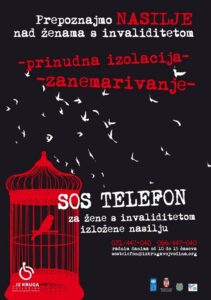
There are two. Recognize violence – when we handed out posters to all institutions and organizations in town. I visited them all – Social Care Center, Nursing Care Home, City Hall, police stations, organizations for persons with disabilities, community health centers – and made contacts everywhere. I remember walking through town and being delighted to see our posters in various places – even today, you can find them in many spots. That action announced the existence of the SOS service for women with disabilities. The second project was Visible – Women with Disabilities. We organized a series of workshops in Subotica and Zrenjanin for women with different disabilities with a broad specter of themes: sex and gender, prejudice and discrimination, violence. Violence was processed in detail: types and forms, support systems, how to get out of it. I worked as a trainer – which I love doing – canvased the terrain in other environments and met great women.
In general, I like street actions. They are exceptional indicators of public opinion. From the reactions of the passers-by on our informative booklets, I can deduce their attitudes towards gender relationships and violence. The liveliest occasion was when we were handing out material at green markets. Males complained: – What do women want now? Some women welcomed us warmheartedly and the others with indifference. One said: – Goodness me, I do not need that! A few people approached me and said it is humane what I was doing. I don’t like the term humane – it puts a woman in the position of a victim and gives me a status of humanitarian aid or a savior. It is not what I am doing! Sometimes there are contrariwise comments, people ready to insult. I remember an older gentleman who got very angry because we were distributing promotional materials in front of the public library. He said: – Better go inside and learn something than walk the streets. I make jokes about those situations. The most frequent questions asked are: Who is protecting the men? Where is a male safe house?
What do you like the least about the job?
The fact that some things don’t change for years. Violence is rooted. Lately, the progress has been visible because we talk about the issue more; there have been actions, campaigns, new SOS lines all around. In general, society is raising awareness, but violence is still considered an integral part of life. – He is male! Excuses are made all the time. I do not like the institutions that have lost their purpose, do not favor women, blame the ones they should be protecting. A woman finally gets the strength to report the villain and then gets the official answer: – No wonder he is like that since you are in that way. Or they tell her: – Madame, I have never seen a victim looking so sleek! I find these terrifying. How can I empower a woman to report to police when she knows how they will treat her? No matter how much we talk about different forms of violence, there are still police officers who assess the severeness of the situation from traces of hair, blood, and scratches. Everything else can be neglected: – Well, they just had a row. I, in my tilt with windmills, mapped various forms of violence that leave no physical trace. I can spend months empowering a woman, and someone from the state institution disputes my work in a second. We propel something, and then we reverse back. The process works in that way; the rhythm of moving ahead and stopping is exhausting.
Name a seminar, book, or a person that marked your professional development.
The milestone was for sure the instruction courses of the Autonomous Women Center. Each lecturer was a discovery. When we were dealing with legal matters, lawyers taught us; when we learned about violence towards marginalized groups, we learned from them; when we dealt with the issues of recognizing the violence, we learned from the trainer pair from the Autonomous Women Center. Each time we got the experience from practice. There were things we needed to do on our own because you cannot do this job otherwise. Last year I took part in a seminar organized by the Women against Violence Network. It was a training for working with women survivors of sexual violence. We have very few calls of this origin – I could count them on my fingers – probably because we don’t empower these victims and don’t work with them enough. The seminar was demanding, but I have learned meaningful things. However, I enjoy all the courses because they combine the things I love and practicality – I like to travel, gain new skills, and socialize with colleagues from all over the country.
Is there a turning point in your professional path so far? Anything that has changed your perception, upset your personal beliefs, changed you in any way?
The change started when I entered the organization …IZ KRUGA – VOJVODINA. I wouldn’t single out any particular moment – it was a process. I learned to understand other people and situations and, at the same time, work on myself. My circle of friends and family has changed too: they learned to recognize violence and comment on it. I knew almost nothing about disabilities and thought about it in medical terms. For instance, I learned the division of mental retardation on cretins, idiots, and morons at the university! Today I pick up a fight for the usage of the term and putting labels on disability. It is not just a thing I adopted, but I am spreading that view on people around me. People close to me learned to recognize if the place is accessible or it has architectural barriers. I suppose we talk about it, scan the ramps when we enter a building. A lot of things changed: my view of male-female relationships and the role and attitude to people with disabilities, spotting violence. I know that change is not something that starts and ends but is a continuous process. There is no person without prejudice; the question is how much do we work on eliminating them; that work never ends.
What makes you the proudest so far in your work?
It is a difficult question for the self-critical person I am. I can be proud of the place I am now and of my contribution to the story. For ages, I was the youngest at seminars, so finding my place in the group was not easy at times. Well, I am proud to be here and to fight for the change. It is a job I am paid for, but it is much more – I believe in this, the work doesn’t last just for the working hours. No, I am totally and always in it, projecting my attitudes through the job. I am so glad I didn’t get a job at school!
You told me once that no one could do this job for longer than ten years. You are halfway through. What are your expectations for the next five years?
If I needed to change something, I am not sure what that would be. I like working directly with the beneficiaries of the SOS service, like being the trainer and informing people of violence – I even have fewer and fewer jitters during media appearances. I would love to upgrade each fragment of my work. If I had to eliminate a thing, it would be keeping statistics and report writing. Administration, database, numbers – makes the job senseless, is deadly, stripped to the bones, and faceless. When I write down in a report that I had five women that week with whom I did ten consultations – it is so cold and inadequate. In the actual meeting: the woman opened herself; she might cry or had second thoughts; we went through her emotional states, we hugged. It makes me crazy when a thing like that is reduced to rigid forms and blank numbers. I short, I expect to have an assistant to deal with administration and statistics.
And after a decade? Where would you like to imagine yourself?
I can dream. All the problems I am facing now are nonexistent; we are not tilting at windmills anymore; rate of violence has dropped. I am aware it is a utopia. There will be some advancement, but I am mindful not much. I would stay in this walk of life because violence will not be rooted out in ten or even a hundred years – it will take different shapes. Violence is transforming following the development of technology. There is digital violence today: being compromised on social networks, stalking via e-mails, online threats, persecution via Viber and Messenger. Women are reachable and located easily thanks to new technologies, which hasn’t been the case before. It is not easy to prove digital violence, and many killings have a history of stalking – nobody took it seriously. The need for this kind of job will always exist, undoubtedly. I might withdraw from practical work with women in person and focus on lecturing.
If you were to hire a person to substitute you at work, what would be the first thing you would have asked?
I would have asked for a reason. – Why are you here? Why do you want to do the job? You can find out a lot from the first sentence. People often ask me how come I am where I am. When women with disabilities are mentioned, they wonder since I don’t have a visible disability. When they speak about violence, they ask me if I had those experiences and look for the reasons for doing the job in them. Whatever the answer from the person that might substitute me would have been, none could be wrong. The fact she came and is interested in this kind of job tells a lot about her. Personal reasons are not decisive. If I had to choose between several candidates, the tone of her voice, attitude, and the manner she talked about violence would show me the right one. There are some traits, I cannot name them, nor can be taught, a kind of ability combining understanding, solidarity, and compassion that are essential for the job. Consultants mutually decode it. Cold intellect and any diploma is not enough for the job. Devoting yourself in three ways is necessary: with your head, heart, and soul.
What anecdotes will you remember for a long time and retell?
On occasion, I would answer my private number with: – IZ KRUGA – VOJVODINA, how may I help you?
In the office, the phone number of the Info Center and the SOS service are the same and, I never know what kind of information I will need to provide. – Good afternoon, is this for invalids? Organization for supporting women with disabilities, how can I help you? – Can you find a chimney sweeper’s number? – Chimney sweeper? – Well, yes, the nearest one, please. I don’t usually deny any service. If they need a chimney sweeper, I will find a chimney sweeper. I should have written all of them down for column laughter as a cure.
There was a situation when a woman called to ask if her sister-in-law could sue her brother for infidelity. I explained that there is no ground for a lawsuit, that she could only divorce him. Another call followed. – Hello, good evening. I heard that a person can get divorced at your office. – Oh no, we only have information about the procedure and the documents you need for it. – Can I submit the documents at your premises then? Chimney sweepers, lawsuits for cheating, divorces outside the court, accompanied with some questions I have no answers to. A woman I had worked with for some time on cycles of violence called one day elated. – Ivana, I know he is going back to his lunar phase! No matter how she dubbed it, I was happy she is not buying the honeymoon phase anymore but sees things realistically and takes attitude.
Sometimes a wrong number is dialed. – SOS service? – Goodness me, no way! – they answer defensively.
